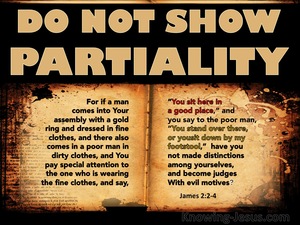◄ James 2 Devotional Commentary ►
James 2:1
The maturing Christian must not only speak the truth in love, but practice their faith in every aspect of their life. We are to live the truth of the glorious gospel of Christ in each and every situation that may arise.
We are not simply to believe in a statement of faith with our intellectual mind, but we are to live out our personal, trusting faith in Christ in every aspect of our daily life. We do this by the way that we live, read more...
James 2:2
There is no shadow of turning with the Lord, and the elderly apostle Peter is one who rehearsed this truth with the fledgling Church at the first council in Jerusalem: "God shows no favouritism." Paul later reinforced this truth by reminding us: "There is no partiality with God," and warns: "Whoever does wrong will receive the consequences of the wrong which he has done, and that without partiality."
read more...
James 2:3
James is challenging his brothers in Christ to examine their motives to see if they are godly or hypocritical. He is pointing out that faith in our glorious Lord Jesus Christ should not reflect an attitude of personal favouritism, and then he goes on to give a brilliant example of hypocrisy that can be found in the lives of many Christians, even inside the doors of certain church fellowships.
He presents a church assembly where read more...
James 2:5
There is no partiality with God, for He is equally desirous to save the rich as the poor, the female as the male, the Gentile as the Jew, the old as the young. While the impartiality of God is perfect, it proves very easy for imperfect man to demonstrate a human preference towards people we consider well-to-do. The fleshly nature of man finds it easy to be biased in favour of those who are nice towards us, especially if they are wealthy and show generosity towards read more...
James 2:10
James reminds us: "Whoever keeps the whole law and yet stumbles in one point, has become guilty of all," which appears to be at odds with the teaching of Paul who insists that we are not under Law but under Grace.
On the surface, this verse appears to be contradicting the good news of the Gospel of Grace, and upholding the Law of Moses by teaching that breaking one part of the law makes a man guilty of all. read more...
James 2:13
The second chapter of James confirms an important Christian principle that Jesus established in His Sermon on the Mount - mercy will be extended to those that show mercy, while the merciless man will face God's judgement. Jesus explained this truth to his audience in Matthew: "Blessed are the merciful, for they shall receive mercy." James expresses the same principle from the opposing position: "For the one who has shown no mercy will be read more...
James 2:14
There are no contradictions in the Word of God, and yet many believers consider this letter of James to be at odds with the teachings of the apostle Paul, for James seems to be basing salvation on works while Paul clearly says, "Having be justified by faith we have peace with God."
James is emphasising that genuine salvation is based on works which can be observed by man, while Paul teaches that genuine salvation read more...
James 2:17
When reading the Bible, it is always important to identify the context in which it is written, or the person, group of people, or nation to whom it is addressed. James makes it clear, right at the beginning of his epistle, that he is writing his letter to Church-age believers. However, we also note that he particularly addresses those from "the 12 tribes of Israel - who had been scattered among the nations," during a time of severe read more...
James 2:19
James did not sugarcoat the gospel of God, nor did he pull his punches when teaching the truth... because he knew the serious and eternal consequences of rejecting the gospel of grace, or of feigning faith in Christ's finished work. Indeed, incredible, satanic deceptions, which distorted the truth of biblical salvation, started to flood into the Church in those early days, and has continued, unabated, into these end times.
One lie read more...
James 2:21
One of the most controversial verse in James, if not in the New Testament, is James 2:21 which states: "Was not Abraham our father justified by works when he offered up Isaac, his son, on the altar?" This verse has caused consternation in the Church and division in denominations. The question continues to rage and appears to contradict Paul's teaching that we are not justified by works, but by faith in the finished work of Christ on the read more...
James 2:26
In the final section of chapter 2, James presents a step-by-step argument on the essentials of our faith and the connection between faith and works. His teaching that we are justified by works appears to contradict that of Paul who insists we are saved by faith alone. But on closer inspection, we find there is no contradiction. Paul is referring to initial salvation, where we are justified in the eyes of GOD by our faith, while James read more...










